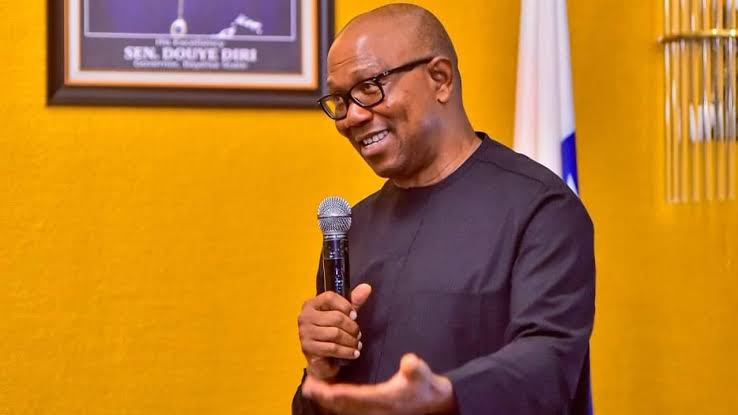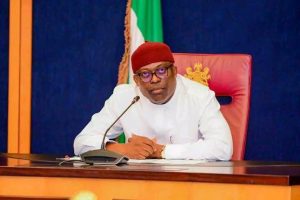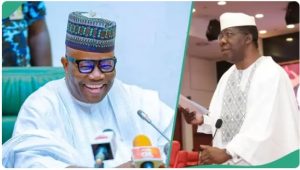₦7 Trillion Budget Scam Proves Nigeria is Run Like a Crime Scene – Peter Obi
Presidential candidate of the Labour Party in the 2023 general election, Mr. Peter Obi, has once again stirred the conscience of the nation with his blunt and unwavering assessment of Nigeria’s political and economic rot. In a bold and unflinching statement issued on May 21, 2025, Obi reacted to BudgIT Nigeria’s shocking report revealing over ₦6.93 trillion worth of dubious projects allegedly inserted into the 2025 national budget by members of the National Assembly. The revelations, which continue to trigger nationwide outrage, highlight the deeply entrenched corruption, misappropriation, and lack of transparency in Nigeria’s budgetary process.
BudgIT, a leading civic-tech organisation known for its budget analysis and advocacy for fiscal transparency, exposed the insertions in a detailed report that shook both public and political spheres. The report identified over 11,000 suspicious projects linked to the leadership of the National Assembly, particularly under Senate President Godswill Akpabio and Speaker of the House of Representatives Tajudeen Abbas, both of the ruling All Progressives Congress (APC).
The findings, amounting to a staggering ₦6.93 trillion, painted a portrait of a legislature seemingly more interested in self-enrichment than national development. The report further accused federal lawmakers of institutionalising a culture of financial abuse and opaque appropriation practices that not only derail national development but also deepen Nigeria’s already dire economic woes.
Peter Obi, in his reaction, described the scandal as another painful reminder of how Nigeria is operated like a crime scene, a description he has repeatedly used to convey the gravity of the country’s governance crisis.
“Nigeria remains a relentless scene of corruption,” Obi posted via his verified X (formerly Twitter) account. “I have consistently maintained that for this country to make progress, Nigeria must cease to function as a crime scene and be repositioned for genuine development.”
The former Anambra State governor, widely regarded for his fiscal discipline and reformist stance during his time in office, was scathing in his critique of what he called “the brazen impunity by our leaders.” He added that the level of corruption demonstrated by the budget scam is proof that public funds continue to be diverted from critical development sectors like education, healthcare, and agriculture.
“This brazen impunity by our leaders is precisely why the country cannot invest adequately in education—hence the existence of nearly 20 million out-of-school children,” he stated.
YOU MAY READ
Sanwo-Olu Slams Peter Obi Over U.S. University Comments: ‘Poverty Worsened, No School Or Hospital Built In Your 8 Years As Anambra Governor’
Citing BudgIT’s detailed analysis, Obi emphasized that the ₦7 trillion in allegedly misappropriated funds could just be the tip of the iceberg.
“These findings are deeply troubling and confirm my long-held position that we have turned our country into a crime scene,” Obi asserted. “We must urgently and aggressively combat corruption, misappropriation, and fiscal recklessness in order to manage our resources effectively and efficiently, and invest in critical areas of development: health, education, and lifting our people out of poverty.”
Obi noted that the failure to strategically invest in these sectors is not due to lack of funds but due to the deliberate mismanagement and theft by those entrusted with public office.
BudgIT’s report laid bare the mechanics of the alleged scam. Lawmakers were found to have inserted thousands of line items labeled as “constituency projects” that serve no strategic national purpose and are often never executed. These projects are often duplicated, overinflated, or entirely fictitious, serving as conduits for siphoning funds.
For instance, several projects appeared multiple times under different ministries or agencies. Some were allocated suspiciously high budgets for mundane or non-essential activities like “empowerment workshops,” boreholes, or unverified training programs. In several cases, the same contractors were linked to dozens of different projects in different regions, raising questions about favoritism and money laundering.
BudgIT also warned that such insertions create logistical confusion and complicate project monitoring, with many Ministries, Departments, and Agencies (MDAs) left unaware of projects supposedly under their purview.
The organisation further accused both chambers of the National Assembly of operating in a closed and opaque manner, with budget hearings reduced to rubber-stamp sessions rather than forums for rigorous scrutiny.
Peter Obi, a vocal critic of governmental excesses, emphasized that Nigeria cannot continue on its current trajectory and expect development.
“We must confront this corruption, misappropriation, and fiscal recklessness with unwavering resolve. Our national resources must be transparently managed and strategically invested in key sectors—health, education, and poverty alleviation—to secure a better future for our people. We must turn this nation around,” he declared.
Obi added that part of the solution lies in strengthening Nigeria’s anti-corruption institutions and reforming the political culture that enables impunity. He reiterated the need for digital budgeting systems, open governance practices, and citizen involvement in public financial decisions.
“It is not enough to simply expose these fraudulent insertions. There must be accountability. The lawmakers responsible must be identified and sanctioned,” he argued.
As expected, the scandal has sparked outrage across the country. On social media, many users expressed frustration over what they described as legislative banditry. The hashtag #BudgetScam2025 trended for hours, with thousands of Nigerians demanding investigations, arrests, and prosecutions.
Civil society organisations have also called for urgent reforms and public disclosure of the individuals and agencies responsible. SERAP, the Socio-Economic Rights and Accountability Project, in a statement urged President Bola Ahmed Tinubu to order an independent audit of the entire 2025 budget.
“If we continue to turn a blind eye to these budget crimes, then we are only deepening the suffering of the Nigerian people,” said Kolawole Oluwadare, SERAP’s Deputy Director. “This is not budgeting; this is organised looting.”
Despite mounting public pressure, most lawmakers named in the BudgIT report have remained silent. Neither Senate President Akpabio nor Speaker Abbas has issued a formal response as of the time of writing.
Attempts by journalists to secure comments from key budget committee members were largely rebuffed. However, sources within the National Assembly suggested that internal deliberations were ongoing, with efforts to suppress dissent and maintain party unity.
Insiders also revealed that a few lawmakers have begun distancing themselves from the scandal, privately accusing budget committee leadership of excluding rank-and-file members from key deliberations.
Analysts believe this scandal could play a significant role in shaping the political terrain ahead of the 2027 general elections. With public trust in political institutions at an all-time low, opposition figures like Peter Obi may find increased support among young Nigerians and urban voters.
“The public sees Peter Obi as a symbol of clean governance and accountability,” said Dr. Obinna Eze, a political science lecturer at the University of Lagos. “Every time a scandal like this breaks, it adds credibility to his message that Nigeria must be rescued from corrupt politicians.”
Others believe the scandal may be too big to ignore.
“The sheer scale of this budget manipulation is unprecedented. If nothing is done, it sends the message that theft of public funds is consequence-free,” said Hafsat Bello, an Abuja-based lawyer and activist. “And if that happens, there is no hope for real development.”
In concluding his statement, Peter Obi called on Nigerians to demand more from their leaders.
“This moment must not pass in silence. Nigerians must demand transparency, accountability, and integrity from those who hold the reins of power. We must not normalize theft and impunity,” he stated.
He urged citizens to become more involved in civic life, from attending town halls to scrutinizing budgetary allocations at the local level. He also called on the media to remain vigilant and investigative.
“It is our collective duty to hold power accountable,” Obi said. “We must save Nigeria from those who treat it like a business venture instead of a nation of 200 million souls seeking progress.”
As the dust from the ₦7 trillion budget scandal settles, one thing remains clear: the questions raised go beyond mere figures. They strike at the heart of Nigeria’s future. Whether this scandal marks a turning point in the country’s journey towards transparency or just another chapter in its history of squandered potential will depend on what Nigerians do next.
Nigeria remains a relentless scene of corruption. I have consistently maintained that for this country to make progress, Nigeria must cease to function as a crime scene and be repositioned for genuine development. This entrenched corruption – persistent and deeply rooted – must be nipped in the bud if there is to be any meaningful turnaround. How else can we explain the distressing revelations by BudgIT, which uncovered a staggering ₦7 trillion in questionable projects inserted into the 2025 national budget? I am convinced that this figure represents only a fraction of the actual amount misappropriated. These findings are deeply troubling and confirm my long-held position that we have turned our country into a crime scene. We must urgently and aggressively combat corruption, misappropriation, and fiscal recklessness in order to manage our resources effectively and efficiently, and invest in critical areas of development: health, education, and lifting our people out of poverty. The ₦7 trillion uncovered as fraudulently inserted into the 2025 budget is even greater than the combined allocations to the Ministry of Health, Ministry of Education, Ministry of Humanitarian Affairs and Poverty Alleviation, and the Ministry of Agriculture – ministries that are fundamental to national development. To be precise: •The Ministry of Education was allocated ₦3.52 trillion, •The Ministry of Health received ₦2.48 trillion, •The Ministry of Humanitarian Affairs and Poverty Alleviation was allocated ₦260 billion, and •The Ministry of Agriculture and Food Security received ₦636.08 billion. Combined, these four ministries were allocated ₦6.896 trillion—an already inflated amount—yet still less than the ₦7 trillion dubiously inserted into the budget. That ₦7 trillion figure is even more than the ₦6.1 trillion allocated to national security—at a time when Nigeria is among the most terrorised nations in the world. This brazen impunity by our leaders is precisely why the country cannot invest adequately in education—hence the existence of nearly 20 million out-of-school children. It is the same corruption that has crippled primary healthcare, resulting in alarming levels of malnourished children. We face widespread hunger, yet our leaders neglect agricultural investment due to persistent mismanagement and lack of accountability. The same disregard affects our capacity to fund national security effectively, or to support Micro, Small, and Medium Enterprises (MSMEs), which are vital to national growth. These glaring acts of corruption reinforce my position: Nigeria has been reduced to a crime scene. We must confront this corruption, misappropriation, and fiscal recklessness with unwavering resolve. Our national resources must be transparently managed and strategically invested in key sectors—health, education, and poverty alleviation—to secure a better future for our people. We must turn this nation around. A new Nigeria is POssible. –PO





